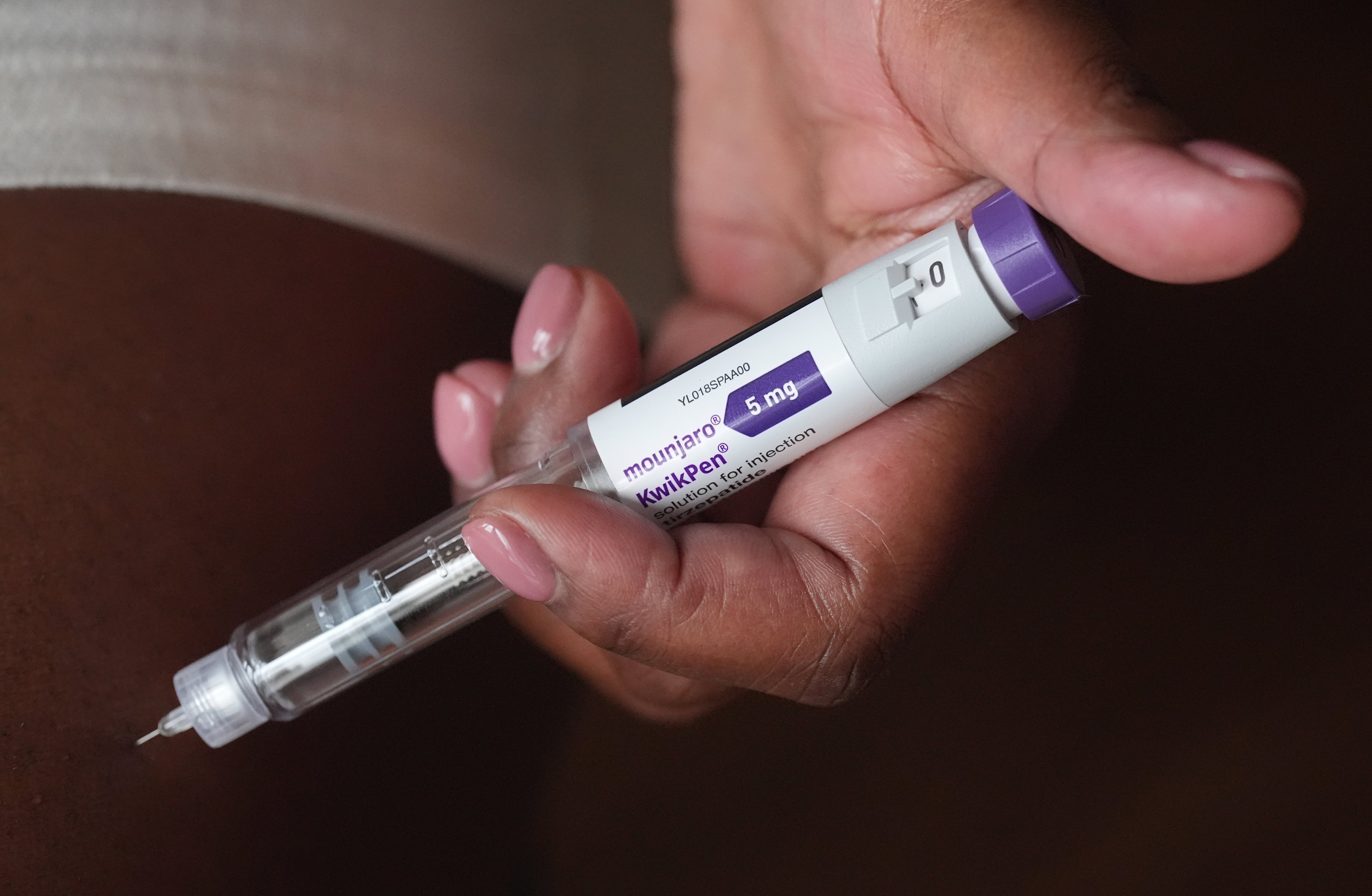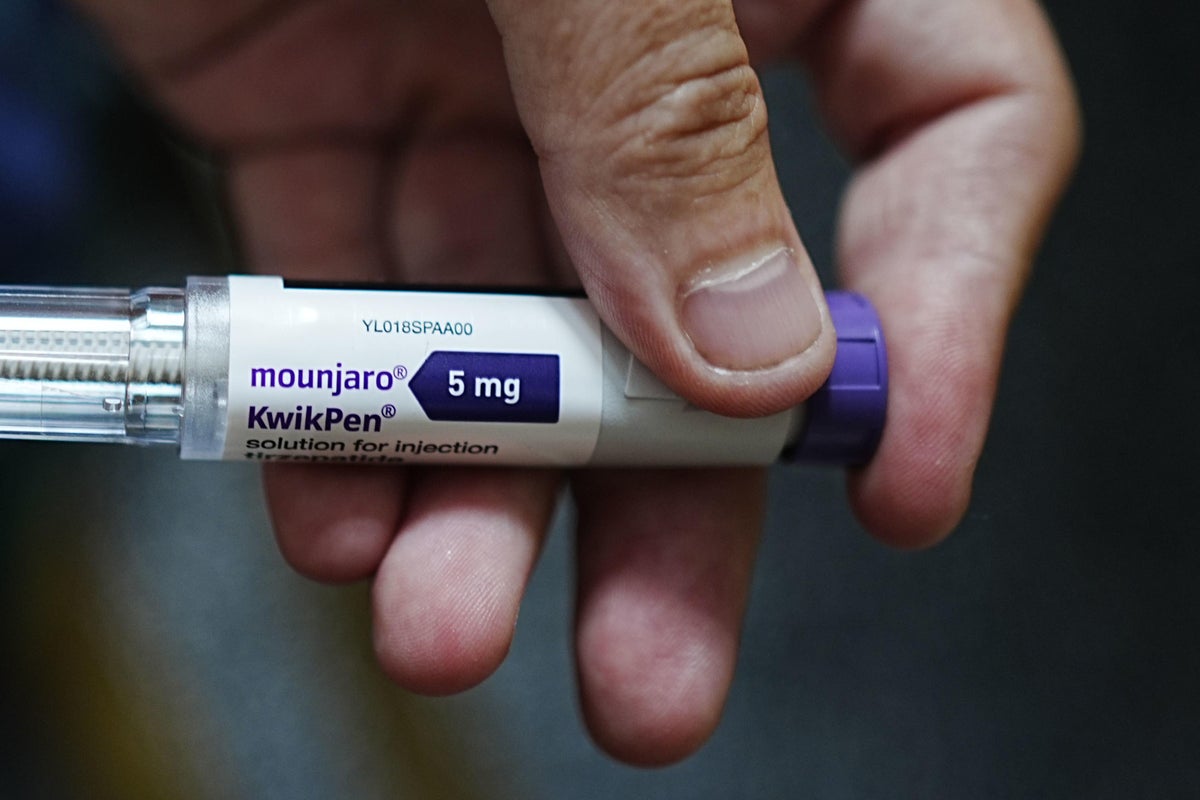Rolling out weight-loss jabs to more people in Britain is “crucial” to reducing obesity, but relying on that alone is not enough to tackle the crisis, experts have warned.
Leading social think tank Nesta says making the drugs more widely available on the NHS is essential if Britain is to bring down the soaring rates of obesity.
But its analysis said jabs are not the only solution – and that a mass rollout could leave taxpayers with a “huge bill” of £42bn over five years.
Instead, the government should roll out weight-loss jabs to a select group of people, while creating a string of policies to tackle other driving factors for obesity, such as the sale of high salt and high sugar foods at checkouts.
The right combined approach could halve obesity in the UK in five years, Nesta said.
“Halving obesity over the next five years is possible, and weight-loss drugs are a crucial part of how that is achievable,” Hugo Harper, director of healthy life at Nesta, told The Independent.
“But relying on weight-loss drugs alone to bring obesity rates down would require a huge bill for taxpayers to pick up.”

Nesta’s exclusive analysis, shared with The Independent, shows that spending £500m a year on jabs for those most in need – around 150,000 people – would be the most cost-effective way of approaching the issue.
That, in combination with other measures, such as banning price promotions on certain foods, could cut the costs of obesity by around £53bn a year.
New figures reported by The Independent last month showed the cost of the UK’s ballooning obesity crisis has risen to a staggering £107bn each year. Tackling obesity was identified as a key policy area in the NHS 10-year plan as the health service looks to cut costs to fill a £6.6bn deficit.
“Our modelling shows that more people will need access to GLP-1 medicines to change our current trajectory,” Mr Harper said.
“[But] it would be both more effective and economical to instead take an approach that distributes weight-loss drugs to treat those people most in need, while also putting in place strong prevention measures – such as mandatory healthiness targets for the largest retailers and stricter advertising restrictions on junk food.”
Nesta’s analysis only accounts for the costs of semaglutide, which is the active ingredient in Wegovy, and not tirzepatide, which is found in the jab Mounjaro and which is the focus of the NHS rollout, which started earlier this year.
More than one in four adults is living with obesity – a level that has more than doubled since the 1990s. A poor or excessive diet is a leading cause of obesity, alongside a lack of activity, genetics, certain medications, and health conditions such as hypothyroidism, which can slow down a person’s metabolism.
The current NHS plan aims to roll out these jabs to just 220,000 in the next three years, as part of a 12-year rollout.
Mr Harper said obesity was at the “root” of the UK’s health challenges, such as cancer and diabetes, adding: “We can’t afford to kick the can down the road on tackling obesity any longer.”
He added: “This is only going to get worse without intervention, as obesity rates are set to rise.”
While expanding weight-loss jabs could save tens of billions, the Obesity Health Alliance agreed that using treatments without tackling the “food environment” – such as the promotion of unhealthy foods in supermarkets – is a “fantasy”.
Alfred Slade, government affairs lead at the alliance, told The Independent: “Presenting the idea that we will just medicate two-thirds of the population forever is a complete fantasy, and we think it’s ridiculous that we’ve gotten to the stage that people feel comfortable with this.
“I think the public has been sold on the idea that this is a miracle cure. They are a tool. They lead to big health improvements.
“But unless we do something to make it easier for people to maintain that weight loss by fixing the food environment in which people live, then it is utterly pointless to spend a huge amount of money on so many people.”
NHS’s plan is not enough
Under the current NHS blueprint for weight-loss jabs, 220,000 patients will be able to access the jabs in the next 12 years. However, current estimates suggest at least 3.4 million patients could be eligible.
Speaking exclusively with The Independent, pharma giant Eli Lilly, which is the supplier of the “king kong” of weight-loss jabs, Mounjaro, warned the NHS rollout is not going fast or wide enough to tackle the problem.
Professor Rachel Batterham, senior vice-president for international medical affairs, said: “In any other disease area that leads to premature death, we would not be saying a 12-year rollout. And I think this also partly just shows the lack of understanding of the impact of obesity on health and the economy of the UK.”
According to Professor Batterham, the current scale of rollout means just 11 people per GP practice would be able to access the treatment.
She said that the prevalence of obesity has increased by 10 per cent over the past decade, so “whatever we’re doing at the moment or have been doing isn’t working”.
She added: “We need prevention to prevent people developing overweight and obesity, and then all of the complications that come with it. But then we also need treatment for the people who already have obesity.”
Weight-loss jabs won’t work alone
Current research suggests the vast majority of people who begin weight-loss jab treatment will choose not to use the drugs indefinitely. When they do stop using the jabs, almost everyone will regain almost 100 per cent of the weight.
Professor Battheram said the “holy grail” for weight-loss jabs would be to get to a stage where a patient can “reset” their weight rather than be on them for life. However, she admitted that research is “a long way off from that”.
Mr Slade added: “We are supportive of greater access to all forms of effective obesity treatment, including drugs, but also the many other things that we think are being slightly underappreciated with all the focus on the drugs.
“The fundamental driver of the obesity rate increases has been the commercial food environment … that it is more profitable for companies to sell food that is worse for our health.”
Currently, bariatric surgery is the only obesity treatment for which there is evidence of long-term outcomes.
Ahmed Ahmed, president of the British Society of Obesity and Metabolic Surgery, said the UK is failing to provide enough access to bariatric surgery because it is “chronically underfunded”.
He said patients are waiting two to three years for surgery, but the NHS could, if the funding was released, have enough surgeons and operating theatres to increase bariatric surgeries from 5,000 to 20,000 a year.
Dr Adrian Hayter, GP and medical director for clinical policy at the Royal College of GPs, said targeting people’s environments as a way of preventing obesity has been largely ignored.
He said: “We haven’t been having this very serious conversation with our patients, which is: yes, you can have these technologies. However, you are also at risk in terms of the environment around you, and food is one of those risks, too.
“This is a wider topic. It’s actually about nutrition rather than obesity. I think sometimes the public, and sometimes politicians, don’t necessarily think about it in that holistic way.”
A Department of Health and Social Care spokesperson said obesity is now one of the leading causes of ill health, and that weight-loss jabs could be one way to tackle the “obesity epidemic”.
“This government is determined to bring revolutionary modern treatments to everyone who needs them, not just those who can afford to pay. This rollout is an important step in making these medicines more widely available and shifting the focus of healthcare from sickness to prevention, which our 10-year health plan will deliver.”



